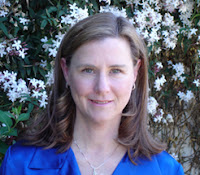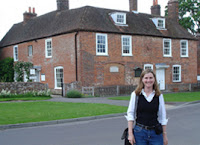
Carla Kelly has won two RITA awards from the Romance Writers of America and has published over a dozen Regency novels, contributed to anthologies, and published fiction outside of the genre, in particular a collection of short stories set in the American Frontier titled Here’s To The Ladies.
Beau Crusoe, her newest release, has just been released. Her last fictional foray (she edited On The Upper Missouri: The Journal Of Rudolph Friederich Kurz, 1851-1852) was in the anthology Wedding Belles, published in early 2004, so Kelly fans have been eagerly awaiting this book. She’s got a new publisher and Beau Crusoe, rumor has it, is a bit racier than her earlier traditional Regencies. Risky Regencies sat down for a virtual cup of tea with the amazingly talented Ms. Kelly.
(And remember, comments on this post will be entered into a contest to win one of two signed copies of Beau Crusoe).
Carla, thank you for being here.
Q. Readers frequently list your books as their favorites of all time; what do you think it is about your writing that readers respond to?
A. Gosh, start off with easy questions… I’m probably the wrong person to answer this. I just write the way I write. A friend of mine did tell me once that she liked my books because the main characters are ordinary, and prone to squaring their shoulders and solving their own problems – probably as most of us do in real life. Maybe we see ourselves in these practical people.

Q. How did you think of writing this particular book? Did it start as a character, a setting, or some other element?
A. It started as a setting, and then the “what if” took over. Several years ago, I read Tony Horwitz’s marvelous book, Blue Latitudes: (subtitled – I think – ‘Going boldly where Captain Cook has gone before.’) Horwitz followed Capt. James Cook’s first voyage in the Endeavor, as he went to Tahiti to observe the Transit of Venus. I was fascinated. Years earlier, I had seen an equally excellent mini-series of Cook and his voyages. And Thor Heyedahl’s Kon-Tiki was the first book I read all night, under the covers with a flashlight. And then there is the towering figure of Sir Joseph Banks, a scientist. There’s a theme here.
My current landlocked status in North Dakota in no way reflects my childhood as the daughter of a naval officer, living overseas or on one coast or the other. I love the ocean, and I know how terrible it can be.
I knew I would write another sea story, because I like writing them – such a C.S. Forester fan I am – and I duplicate no other writer when I do it. This matters to me.
Q. How long did it take? Was this an easy or difficult book to write?
A. It took too long. I was moving along on the Beau when Harlequin announced it was dropping its historical line. My agent and I decided it was best to stop, because the terms of my contract didn’t include the subscription-only idea Harlequin hatched. So I quit writing it.
The, when Harlequin announced it was starting the line again and all was forgiven, I was so irritated I didn’t feel like writing. Plus, since I had no prospects after the line was discontinued, I’d taken a job as staff writer for a small, understaffed daily newspaper in our town. This eventually meant I had to ask for two extensions on the deadline because – irony of ironies – I was too busy writing to write. I’m still working for the newspaper, but if Harlequin will agree to my next two proposals, the paper will get an instant two-week notice. I work too hard for too little pay there, but that’s North Dakota.
The story itself wasn’t difficult. I knew what I wanted to say. Yeah, well, it was 100 pages longer than the story you have, so I needed to trim.

Q. Tell me more about your characters. What or who inspired them?
A. The Beau is really an amalgam of naval officers who also were amateur scientists. He was not alone in his interests. The growth of England’s sea power, coupled with the happy era of interest in the natural world, gave the study of natural science a huge push. These amateur scientists fascinate me. I wanted the Beau to be among that august company. And there was Sir Joseph Banks. Oh, my. And Susanna was just trying to make the best of a bad situation, as we often have to do, even now.
Q. Did you run across anything new and unusual while researching this book?
A. I learned a great deal about fiddler crabs! I still have a small drawing of one perched at eye level above my computer. My husband enlarged the drawing, which I plan to frame, as my little gift to me for Beau Crusoe. I also learned more about the Royal Society, which still awards a Copley medal.
Q. What is it about the Regency period that interests you as a writer?
A. In two words: Napoleonic Wars. Beyond that, I’m interested in an era where people knew their place and lived their lives within a narrow sphere. The Industrial Revolution was starting to make itself felt, too, when there would be many wrongs to right, and people wouldn’t know their place anymore.
Q. What do you think is the greatest creative risk you’ve taken in this book? How do you feel about it?
A. It’s sexier than my other books. I’m ambivalent, particularly since Beau’s encounter with Lady Audley is so blatant. I tried to make it ironic and ruefully witty, and hope I succeeded. Don’t think I’m going to send this one to my 85-year-old mum, though.
Q. Is there anything you wanted to include in the book that you (or your CPs or editor) felt was too controversial and left out?
A. Yes, actually. I wrote a “Dear Reader” after the final chapter, which was an epilog, of sorts, bringing the story all the way up to the present. My editor seemed to think this would confuse readers into thinking the novel was a true story, and asked not to include it. I disagreed with her, but went along. Perhaps, unlike her, I know and trust my readers’ intelligence and know they would not be confused.
HOWEVER, if, after reading the book, any readers are interested, I will happily e-mail that “Dear Reader,” and they can attach it to their copy of Beau Crusoe. I will e-mail it only after they have finished the book: ckelly@ daktel.com

Q. In Here’s to the Ladies, you wrote about Frontier America, and also wrote in the first person in at least one of the stories in the collection; what other time periods and/or writing styles have you, or would like to, try?
A. When I finished Beau Crusoe, I sent my editor at Harlequin a detailed outline for a novel set at Fort Laramie during the Great Sioux Wars. It’s a novel I really, really want to write, because I know this subject so well. I also sent a detailed outline for a novel set in 1701 at Castillo de San Marcos in St. Augustine, which I really, really want to write. She could not have been less interested. She also broke the news gently to me that all Harlequin wants are more Regencies from me. Seems a shame. I decided not to write any more, but recently ate my words and sent her one detailed outline for another regency, and a sketch of a second. I’m doing this because a) I really am eager to stop writing for the newspaper b) I have two excellent ideas here. Maybe I’ll toss in a third and we can call it a Portsmouth Trilogy. But each book stands alone. I’m not a fan of spinning on more and more characters that appear everywhere, like Where’s Waldo.
As for other styles, I’m comfortable with the way I write, which I suspect is a little different than some.

Q. What are you working on next?
A. Depending on whether my editor likes my next two ideas, probably a Regency set in the grubby naval town of Portsmouth, during the darkest days of the Blockade brought on by Napoleon’s Berlin and Milan Decrees, and the British answer – Orders in Council. People are hungry, fortunes are few, and times are tough. (Aren’t people always more interesting when times are desperate?)
In the sketchy outline for the 2nd book, there’s nary an aristocrat in sight. I seem to be specializing in dukeless books, which I’m sure suits my readers, because I never seem to get those right, anyway. And if Harlequin isn’t interested in those, I’ll probably just go ahead and finish my Wyoming story set in 1910. Well, I’ll finish that, anyway, and then sell it to a publishing house in Utah, which is interested.
Q. Is there anything else you would like readers to know about you or your books?
A. I do so much more than write Regencies. I’m sure that’s true of all writers.
Thank you, Carla!
 Welcome to the Riskies, Christie! I’m very excited about this book because I was a critique partner with Christie, and I can’t wait to read the finished version. Christie will drop by during the day to answer questions and comments, and the Riskies will pick a winner, who will receive a signed copy of the book (the usual rules apply–no masquerading under different handles–we know who you are and we will say rude things about your cats).
Welcome to the Riskies, Christie! I’m very excited about this book because I was a critique partner with Christie, and I can’t wait to read the finished version. Christie will drop by during the day to answer questions and comments, and the Riskies will pick a winner, who will receive a signed copy of the book (the usual rules apply–no masquerading under different handles–we know who you are and we will say rude things about your cats). At twenty-six, aspiring novelist Avis Copley intends to wear spinsterhood as a badge of honor. But when she discovers a volume of erotica that ignites a searing fire within her, Avis realizes just how much she doesn’t know about the actual pleasures of the flesh. Determined to learn more, she devises a daring plan…
At twenty-six, aspiring novelist Avis Copley intends to wear spinsterhood as a badge of honor. But when she discovers a volume of erotica that ignites a searing fire within her, Avis realizes just how much she doesn’t know about the actual pleasures of the flesh. Determined to learn more, she devises a daring plan…







